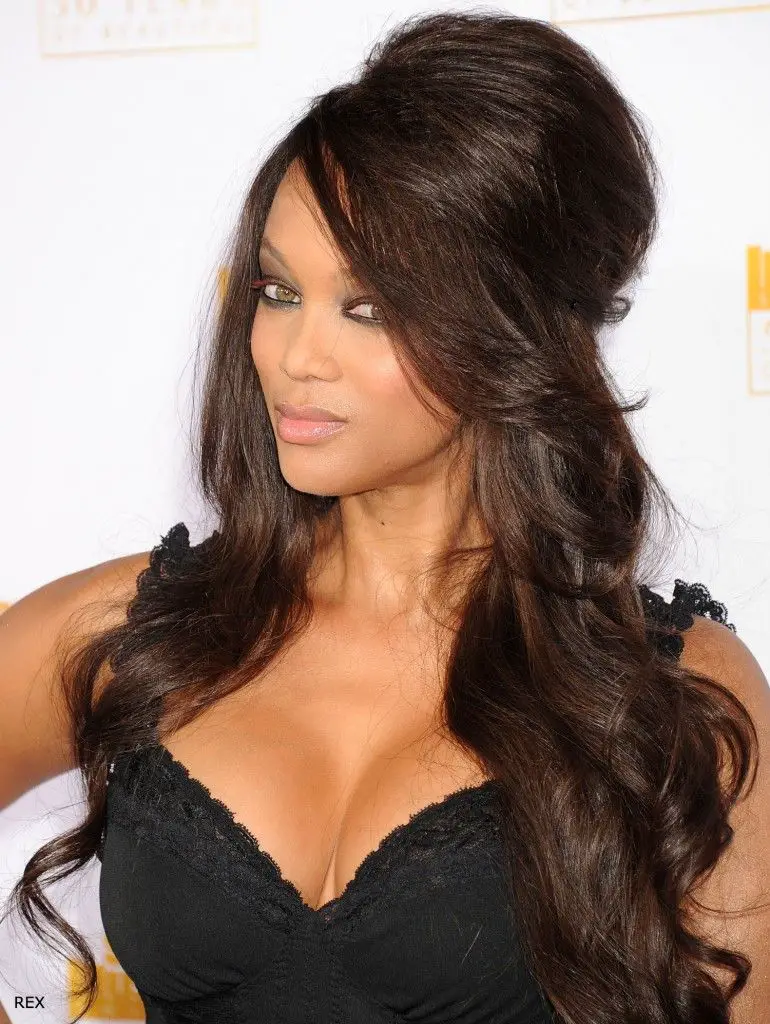Here’s a detailed look into 1970s hairstyles updos, highlighting their textures, influences, and how they’re recreated today:
Table of Contents
Popular 1970s Updos & Styling Techniques
70s Hairstyles Updos #1. Half-Up Bee hives (“Half-Up Beehive”)

A glamorous, elevated twist on the classic beehive, this style featured the crown section teased and shaped while the rest of the hair cascaded loosely below.
It remained popular throughout the ’70s before evolving into softer looks.
2. Beehive / Hive Updo
Although the beehive originated in the 1960s, its dramatic volume carried into the early ’70s.
Achieved by backcombing or teasing, the hair was shaped into a conical mound atop the head and smoothed over.
The name was coined after a journalist noticed its resemblance to a beehive. Modern recreations (as “Hive Updo”) simplify the styling while preserving volume and presence.
3. High Updos with Romantic Flair
Formal events saw tall updos that valued elegance but also embraced a relaxed, romantic feel.
These often featured gently tousled tendrils framing the face, soft volume, and structural height.
4. Flicks, Wings & Flippy Ends
Although not strict updos, these techniques influenced how hair was incorporated into partial up styles:
- Flicks & Wings: Hair curled outward at the ends formed “wings” around the face, giving a polished shape.
- Flippy Ends: Characterized by curled-out ends that flipped away from the face, creating lift and movement—common in both loose and pinned-back styles.
5. Low Pigtails
While not strictly updo, they were styled with a loose, airy aesthetic—often at ear-level and enhanced by volume at the crown—straddling the line between casual and styled-up.
6. Flower-Accented Updos & Braided Touches
Evening styles frequently combined texture and decoration—think braided chignons, soft roller-set curls pinned up tastefully, or floral embellishments over a tucked-under ponytail.
Style Notes & Cultural Touchstones
- Volume was everything—from teased heights in beehives to sweeping flicks. The ’70s embraced “go big or go home” beauty ideology.
- Celebrity influence was strong—icons like Farrah Fawcett popularized the feathered “Farrah Flick,” while disco culture leaned toward lively, voluminous curls. Even today, the look endures.
- Modern revivals: Today’s stylists tap into ’70s flair with updated techniques—bringing back curtain bangs, voluminous roller curls, headbands, scarves, and nods to updo structure in fresh ways.
Quick Reference Table
| Style | Description & Elements |
|---|---|
| Half-Up Beehive | Crown teased into volume; rest left flowing — dramatic nostalgia. |
| Full Beehive (“Hive Updo”) | Entire hair teased into a tall conical shape — retro statement look. |
| High Romantic Updo | Elegant, tall styles with soft drapes and face-framing strands. |
| Flicks / Wings / Flippy Ends | Ends curled outward; often incorporated into updos for shape and flair. |
| Low Pigtails | Loose, airy, styled at ear level with crown lift—casual meets updo. |
| Braided/Accessorized Updos | Braided chignons, pinned curls, decorated with flowers or delicate adornments. |
Final Thoughts
The 1970s proved that hair wasn’t just a detail—it was a statement. Updos from that decade combined texture, drama, and elegance, evolving past their origins into sleek or relaxed shapes, depending on the setting. Today’s stylists draw from that ethos, modernizing ’70s looks to suit contemporary tastes while retaining their bold charm.
Age is just a number, and when it comes to hair, there are no limits to embracing your unique style and beauty.